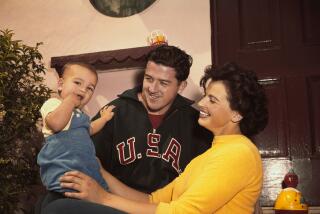Foot Soldiers on the Cultural Divide : Customs: A mostly volunteer squad keeps the international peace during World Cup ’94. These diplomats have turned protocol into a fine art.
- Share via
The Brazilians gasped.
At their consulate in San Francisco last April, Brazilian dignitaries and World Cup ’94 officials had nodded their approval to a plan to fly thousands of eager fans to Brazil’s opening match against Russia. But with one gesture, an American World Cup official slipped over the cultural divide: He flashed the OK sign.
The 100-page World Cup Protocol Manual contains the standard diplomatic no-nos--no big arm movements; no gum chewing; always shake with the right hand, never with the left--but nothing warning them of such a faux pas.
“The three consular officials just gasped in horror,” recalled David Sternberg, World Cup protocol manager for San Francisco. “As it turns out, that symbol is about 10 times more offensive than the middle finger is in our country.”
For a brief, unshining moment, the atmosphere was “pretty scary.” But after a short exchange, everyone laughed.
In the words of one participant, protocol is “the fine art of avoiding an international incident.” For the tournament’s 800 mostly volunteer diplomats, protocol is a mad sprint across nine cities, full of sleepless nights attending to everyone from Cameroon’s tribal chieftains to the crown princes of Saudi Arabia.
Protocol for the monthlong, 24-nation tournament is coordinated by executives in the World Cup ’94 headquarters in Los Angeles. The diplomatic foot soldiers are a mix of world travelers, former White House advance personnel and volunteers just out of college who suddenly find themselves rubbing elbows with State Department experts and Secret Service agents who speak into their lapels.
“It’s heady stuff,” said Lisa Amore, World Cup ‘94’s protocol chief for Washington and a veteran of several international cultural events.
One day in early June, Amore was waiting on the Tarmac at Dulles International Airport as Crown Prince Faisal and his massive entourage touched down. They joined a caravan of more than 200 artisans, musicians and folk dancers there to celebrate their country’s dark-horse bid for the World Cup.
But Amore was worried. Prior to the royalty’s arrival, she had sat through a 30-minute film introducing Saudi Arabia to protocol officials. It contained no women. Amore could find only one female on the staff of the Saudi Embassy--an assistant, and she was British. “I didn’t know what the Saudis would think of a woman running the protocol department,” she said. “I wasn’t sure I’d be respected.”
The ice-breaker came the following day, when dignitaries and royalty posed for pictures at the Ritz-Carlton hotel in Tyson’s Corner, Va. Amore watched as Prince Waleed bin Bader stared stone-faced into the camera.
“You can smile, you know,” Amore boldly told him. The prince began to nervously crack a smile, she said, and for the next several minutes “had a serious case of the giggles.”
From the beginning, the Saudis spared no expense as they invited the entire 50-person Washington protocol office to the embassy for a lavish four-hour dinner.
There was one problem: no chairs. “We sat on the floor, fidgeting the whole time as our legs fell asleep,” Amore said.
In her World Cup role, Amore has stirred the waters of inspiration in several cultures. During a telephone interview, Amore said: “I am currently being serenaded by a bunch of French ministers.” (Her last name being ideally suited for crooning.)
*
The mirth in Washington belies the fact that Amore, like her counterparts in other cities hosting matches, is sleeping three hours a night, attending to late-hour phone calls and myriad requests in different languages from various time zones.
Jonathan Moller, the Los Angeles-based director of all World Cup ’94 protocol operations, attends to his duties with the scientific precision of C3PO, the protocol droid from “Star Wars.”
A change in plans? “We would need to take the venue scenario out of the holding zone and modify it to accommodate the new schedule,” he said.
Pardon?
“We leave nothing to chance.”
It’s a long way from his days as an intern for the 1984 Olympics in Los Angeles. Moller, now just 28, went on to write his master’s thesis at Columbia University on the history of protocol in the United States and runs his own international diplomacy business out of New York City.
Moller’s piece de resistance so far is the June 17 opening ceremony in Chicago, a “Gargantuan” and “monstrous” undertaking that involved weeks of preparation, handling everyone from President Clinton and Bolivian President Gonzalo Sanchez de Lozada to German Chancellor Helmut Kohl and Oprah Winfrey.
After flying into the 95-degree heat in New York the following day, Moller said that “I was so exhausted that I couldn’t lift my carry-on bag off the plane.”
Ceremonies surrounding the July 17 final in Pasadena are likely to be “a similar headache,” he said.
*
While Moller was slaving away in Chicago, Mark Woodbridge prepared the protocol troops in Dallas for quite a different fete: Nigeria versus Bulgaria. The June 21 battle of the non-traditional rivals provided a study in contrasts.
The Nigerian delegation, which included several tribal chieftains and a princess, arrived decked out in a rainbow array of flowing robes, kente cloth stoles and kufi caps.
When a reporter asked Woodbridge to identify the chieftains, the Dallas protocol chief showed that even seemingly trivial details require a diplomat’s sensitivity.
“There are 27 tribes in Nigeria. If I listed one name, then some chieftain would wonder why I didn’t list his name. Then I’d have to list all the names,” he said. “It’d be a big mess.”
He did say, however, that the Nigerians were “a happy, jolly, fun kind of people.”
By contrast, the Bulgarian delegation was stern and remote, with “a real ex-Communist country kind of feeling,” Woodbridge said.
While Dallas’ brimming Nigerian community was more than happy to cheer on its team, the handful of former Bulgarians there declined to greet visiting officials, afraid of awakening ghosts from the Cold War, he added.
For the Colombian delegation, who marched into the Rose Bowl heady with Pele’s predictions of world domination, the World Cup became a grim undertaking.
Following his team’s stunning June 22 defeat by the United States, Simon Gaviria, 9, son of former Colombian President Cesar Gaviria, begged to be taken to Palo Alto for the next match against Switzerland, said Susan Metzler, protocol chief for Los Angeles. But Dad would have none of it.
“He was not as eager to go, because of the loss, I think,” Metzler said. “He wanted to return to Colombia.”
*
For some, like the Saudis, even a loss can be a cause for celebration.
Arriving in three motorcades for the opening game on June 20 at RFK Stadium, Princes Faisal, Sultan and Bandar, along with some 300 other dignitaries, dwarfed the 50-person Dutch delegation.
The limousine procession moved at a hair-raising pace through the streets of Washington almost until the first chords of the Saudi national anthem, Amore said. Not 10 minutes before the game started, Prince Bandar, the Saudi Ambassador to the United States, decided he wanted to leave the luxurious quarters in the Tribune of Honor, high above the crowd, and sit below with his family.
Suddenly, the Saudi advance people were wondering if the other princes might like to do the same--which would have entailed moving 45 people in a matter of minutes.
“I had to quietly explain that it wouldn’t be such a good idea,” she said. “There was just one seat for Prince Bandar. I said ‘Looking down, you can see there are no more seats. Wouldn’t it be much more comfortable up here where there’s water and fans?’ ” The Saudis eventually agreed.
Despite the 2-1 loss, she said, Faisal “just jumped out of his seat” after Faud Amin’s wildly unexpected header into the goal, leaving the Saudis in a festive mood.
Long before the games even started, Saudi Embassy officials put out the word that the visitors wanted 24-hour attention during their stay. They found their man in Gus Suleiman, 25, a Jordanian American businessman who went to preschool in Saudi Arabia and a military academy in the United States.
At their expense, Suleiman was given his own quarters next to the Saudis at the Ritz-Carlton and flies with them to matches across the country. Suleiman, a mere volunteer when the Saudis found him, said he does not worry whether his job as a hotel desk agent is waiting for him when it’s all over.
“I was willing to take the risk,” he said. “Besides, I’m pretty sure I can charm my way into anything.”
More to Read
Sign up for Essential California
The most important California stories and recommendations in your inbox every morning.
You may occasionally receive promotional content from the Los Angeles Times.










